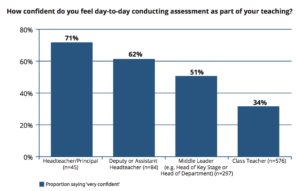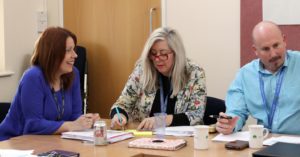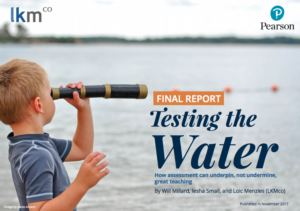Most classroom teachers lack confidence in assessment says Testing the Water by LKMco and Pearson
by Will Millard
30th November 2017
- Testing the Water, a new report by LKMco and Pearson calls for better accountability measures, more support for teachers, and greater understanding of assessment across education sector.
- Government, schools and assessment bodies must do more to put assessment at the heart of great teaching.
- Report analyses assessment systems across the world and features contributions from world-leading experts.
- All trainee teachers should be tested on their understanding of assessment, according to report by leading education think-tank LKMco, and education company Pearson.
Testing the Water calls for significant changes in the assessments that are at the heart of our education system.
The call for change comes in response to revelations that:
- Only a third of classroom teachers in England feel ‘very confident’ about assessment.
- One in five classroom teachers would not know where to look for information on assessment if they needed it.
- Under half of teachers received training in assessment as part of their initial teacher training.
Today’s report, “Testing the Water” is based on a year-long research project involving:
- A national survey of over 1,000 teachers in England by YouGov;
- Focus groups with parents, governors pupils and teachers around the country;
- An online consultation;
- Think-pieces from fourteen leading educationalists; and,
- Three international case studies.
Assessment has been described as “the sine qua non of the competent educator.” Without knowing what pupils have learned teachers do not know when to move on and how to adapt their teaching. The report identifies eleven major challenges for educational assessment and makes a number of recommendations for ensuring assessment “underpins, not undermines, great teaching”.
Lead author of the report, Will Millard said:
“This report’s revelation that only a third of teachers feel ‘very confident’ undertaking assessment is deeply worrying, although I fully sympathise. Despite having been a teacher myself, I learned a huge amount undertaking this research and have come to realise that assessment is as important as it is technical. A Central Assessment Bank and greater access to in-person and online training would therefore make a real difference for classroom practitioners, and improve confidence and pedagogy in our schools.”
One of Testing the Water’s key recommendations is for teacher training to include a compulsory test at the end of teachers’ initial training to ensure they have mastered key elements of a training curriculum, including assessment. At the moment teachers’ are primarily certified based on a portfolio of evidence.
Director of LKMco, Loic Menzies said:
“Over the years I have assessed dozens of teachers for qualified teacher status and, while newly qualified teachers certainly shouldn’t be expected to have learned everything by the end of a year’s training, there is some crucial content that every qualified teacher needs to know. This includes key principles of safeguarding, special educational needs, curriculum, and assessment. Our research shows that fewer than half of teachers received training in assessment as part of their initial teacher training.”
“Whilst passing a driving theory test isn’t enough to make you a good driver, and learning to drive doesn’t mean learning to pass a theory test, a theory test has still been part of securing a licence to drive for over twenty years.”
Access to high quality materials
Testing the Water also calls for teachers to have easier access to high quality materials through a bank of approved assessment materials, through a new assessment bank. This is one of four recommendations addressed by education company Pearson in their response to the report.
Assessment in context – taking unnecessary pressure out of the accountability system
The report also recommends that government and regulators consider whether assessments – particularly summative assessments like SATs and GCSEs – put too much pressure on pupils, teachers and schools. The report recommends that school league tables should use three-year averages, to ensure accountability is based on more rounded data.
In response to the report, President of Pearson UK and Core Countries Rod Bristow said:

“Testing and assessment was invented by the teaching profession – because it plays a vital role in learning. But, given the pressures on assessment today it’s time to rethink the role assessment plays in underpinning learning. Testing the Water shows us how much more we all have to do to support teachers in using assessment to improve learning.
“I’m not just joining the call for change; we are taking energetic action in announcing four commitments to enable teachers to use assessment more effectively”:
- Pearson will establish an assessment bank: The bank will provide tools to support assessment that encourages and enables teaching beyond the requirements of high stakes exams.
- Pearson will provide free access to scripts: Pearson will indefinitely extend its popular and free service that provides access to scripts, and add analytical tools to support better teaching.
- Pearson will publish an annual monitoring review: The review will unpack data on the reliability of assessments and comparability across subjects.
- Pearson will develop an assessment charter: Pearson will invite students, parents, teachers and governors to work with the organisation to create a Pearson Assessment Charter in 2018. This will provide coherence and transparency across Pearson’s formative, summative and high stakes assessments.
International case studies in the report highlight:
- The link between teaching resources such as textbooks and assessment in Finland;
- Grading soft skills and the implementation of assessment reforms in Japan, and;
- Using accountability to promote dialogue between school practitioners and inspectors in Ontario, Canada.
In their ‘Magic Wand’ pieces leading experts make the following calls:

- Professor Dylan Wiliam argues that we should embrace the unreliability of assessment.
- Chief Executive of the National Governors’ Association Emma Knights says that governors should make sure assessment does not result in excessive stress for teachers.
- Chief Executive of the Chartered College of Teaching Alison Peacock rails against a culture of “fearmongering to ensure hard work”.
Other contributors include:
- Adam Boddison, Chief Executive, nasen.
- Allana Gay, Deputy Headteacher, Lea Valley Primary School.
- Daisy Christodoulou, Director of Education, No More Marking.
- Harry Torrance, Professor and Director of the Education and Social Research Institute, Manchester Metropolitan University.
- Geoff Barton, General Secretary, ASCL.
- Mary Bousted, Joint General Secretary, National Education Union.
- Michelle Doyle Wildman, Acting CEO, PTA UK.
- Neil Carmichael, former Chair of the Education Select Committee.
- Paul Whiteman, General Secretary, NAHT.
- Rob Coe, Professor of Education and Director of the Centre for Evaluation and Monitoring (CEM), Durham University.
- Tim Oates CBE, Group Director of Assessment Research and Development, Cambridge Assessment.
Full list of Testing the Water’s recommendations:
- The Department for Education alongside other organisations should develop a Central Assessment Bank.
- Trainee teachers should pass an assessment test before qualifying.
- Assessment organisations and universities should provide in-person and online training to share their expertise with practitioners.
- The Department for Education alongside other organisations should use their websites to signpost towards quality assessment resources, products, and training.
- Assessment training must cover both the theory and practice of assessment.
- Assessment training must cater to the needs of professionals working in different roles, including:
- Senior leaders;
- Middle leaders;
- Class teachers;
- Teaching assistants, and;
- Governors and parents.
- Teachers must be clear on the purpose of their assessments, identifying what information is needed, and by whom. They can then select different assessments based on this.
- Schools must cut the time class teachers spend conducting summative assessments so that they can focus on conducting diagnostic, formative assessments.
- Schools should use standardised tests to benchmark and report pupils’ achievements.
- Everyone – but especially teachers – should know how reliable assessments are.
- Assessment providers should provide easily accessible and digestible information about the reliability of their assessments.
- The Department for Education should develop a system of matrix sampling for assessing more of the National Curriculum (while minimising the number and length of tests pupils need to sit).
- Teachers must be given a sensible timeframe in which to implement curriculum and assessment reforms.
- The Department for Education should build experimentation and evaluation into assessment and accountability reform, to better understand how its reforms impact upon standards in schools.
- Ofsted should enhance assessment training for its inspectors.
- The Department for Education should present schools’ performance data as three-year rolling averages.
- The Department for Education and other organisations (including schools) must ensure teachers can access high quality assessment training and resources.
- The Department for Education must work with stakeholders including teachers’ unions to ‘myth-bust’ statutory assessments.
- Improved access to quality training and resources could shift schools towards more efficient assessment practices, specifically:
- Reduced use of marking;
- Keeping the number of mock tests and exams to a minimum, and;
- Using technology effectively.
- The Department for Education should stop reporting schools’ performance using the ‘EBacc’ performance measure, and instead focus on Attainment 8 and Progress 8.
- Schools should use more low stakes assessments.
- Schools must decouple pupils’ test results from teachers’ performance evaluations.

Notes for Editors
- Follow the conversation on twitter using #TestingTheWater
- The full report will be available on 30th of November at https://www.pearson.com/uk/web/testingthewater.html
- All figures, unless otherwise stated, are from YouGov Plc. Total sample size was 1,002 adults. Fieldwork was undertaken between 5th to 16th October 2017. The survey was carried out online.
Contact
- For further information or to request any of the following please contact Loic Menzies ([email protected] // 07793 370459) or Will Millard ([email protected] // 07900 342497)
- Interviews with spokespeople from Pearson, LKMco, or teachers and experts who contributed to the research
- Sector specific data (FE colleges, Secondary, Primary and Early Years) and regional specific data.
- Charts displaying the key findings in the report.
About Pearson
Pearson is the world’s learning company, with expertise in educational courseware and assessment, and a range of teaching and learning services powered by technology. Our products and services are used by millions of teachers and learners around the world every day.
Our mission is to help people make progress in their lives through learning — because we believe that learning opens up opportunities, creating fulfilling careers and better lives.
About LKMco
Testing the Water was written by the education and youth development ‘think and action-tank’ LKMco. LKMco works across the education, youth and policy sectors, helping organisations develop and evaluate projects for young people and carrying out research as well as campaigning on the issues that make a difference to young people.
cfey.dev //@LKMco // 07793 370459


